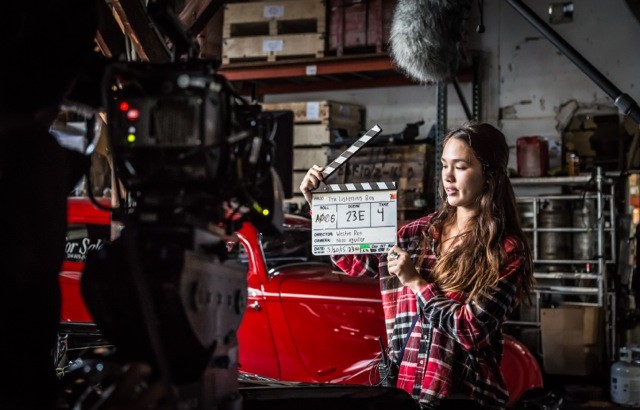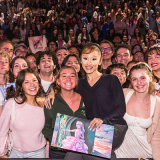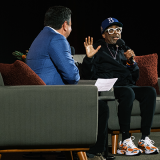
Summer Sessions Offering Screenwriting, ProTools, Travel, and More…
April 19, 2016
Summer is just around the corner, and that means, laying in the sun, lounging by the pool, and taking in a few of our fantastic offerings!
Here is a list of classes you can take during our summer sessions.
Summer Session I (6 weeks)
May 31st-July 9th, 2016
FTV 329-01/FTV 529-01: Rewriting the Feature Screenplay – Jeff Phillips
- Students will rewrite completed scripts previously finished in other classes. The goal is to embrace the concept of rewriting and understand its purpose and application in screenplay development. The result will be a completed feature length screenplay. The instructor’s job is to guide you through the process, providing insights into the craft of professional screenwriting.
FTV 329-02/FTV 529-02: Emerging Media: Digital Aesthetics, Narratives, and Culture – Maja Manojlovic
- Following the widespread digitization of visual technologies in the 1990’s and the increased use of mobile communication technologies in the 2000’s we are currently riding a wave of emerging media technologies. Without a single unifying definition, what we call “emerging media” determines not only our communications but also implies a cultural practice – a “participatory culture” characterizing our “digital lifestyle.” This course will therefore engage emerging media both practically and theoretically. We will theoretically explore not only emerging media technologies, but also their effects on users. This course will include a practical, hands–‐on Transmedia workshop culminating in a final Transmedia project. Each student will be responsible for creating a Transmedia story (or a critical studies project) that develops content on multiple media platforms.
FTV 329-04/FTV 529-04: Producer Initiative – Staff
- Two twenty-minute scripts developed by Dodge producing students during the spring will be produced in this class with budgets of up to $15,000 each. Students will be assigned to key creative roles (director, DP, production designer, editor, etc.) and as crew in all production department.
FTV 329-05/FTV 529-05: Maneuvering Film Festivals – Edwards Bloom
- Maneuvering Film Festivals is a hands-on strategy and marketing workshop for students who have films (or are about to have films) that may be festival worthy so as to start preparing for their festival journey. It will provide an introduction and overview of what type of strategy is needed to get the most out of the 4000+ film festivals around the world. This course will provide valuable tips and resources to help organize and create necessary materials and tools needed to have a productive and beneficial festival experience.
FP 359-01/FP 559-01: Pro Tools Certification – Dan Pavelin
- This course is designed to give students immersive, hands-on training in Avid Pro Tools, the industry-standard software for recording, editing, and mixing professional sound. It will cover all basic features of the application as well as advanced functions such as Elastic Audio, MIDI and virtual instruments, and a full spectrum of editing tools and techniques. The course prepares students for the examinations required for “Pro Tools Certified User” status from Avid, which are administered within the course. Chapman does not award Pro Tools certification.
FTV 361I-01/FTV 561-01: II Cinema Ritrovato Film Festival Bologna, Italy (Travel), Emily Carman
- Film history lives…in Bologna, Italy this summer! Tour the film restoration lab and cinematheque, explore the walled city of Bologna, enjoy world famous cuisine, marvel at historic medieval architecture, and enjoy great films in contemporary theaters and outdoor evening screenings in the charming Piazza Maggiore! Previous programs have featured important directors such as Alfred Hitchcock, Vittorio De Sica, Martin Scorsese, and William Wellman; Czech and Polish New Wave; Technicolor cinema; Bigger than Life: Widescreen and Cinemascope Retrospective, among others.
FP 507-01: Filmmakers & Actors Workshop – Dave Kost
- A group experience in which student filmmakers get an intensive hands-on experience working with each other and with actors in rehearsal and production. The class is a workshop in which faculty mentor students during the making of actual productions. The class takes unique advantage of a concurrent class offered through the Theatre Department. The students from both classes will work on common projects and the interaction of these differing student pools is one of the primary benefits of the class.
SW 587-01: Short Script Workshop – Mary Beth Fielder
- An intensive workshop in writing short screenplays. Students are encouraged to work in a variety of styles, and have the opportunities for rewrites and collaboration.
SW 587-02: Short Script Workshop – Bill Rosenthal
- An intensive workshop in writing short screenplays. Students will write in a variety of styles and complete a number of short scripts.
TWP 328-01/FTV 529-06: Seminar in Television Writing -James Macak
- A study of the techniques for writing half-hour comedies and one-hour dramatic scripts for television.
TWP 374-01/TWP 574-01: Art and Business of Web Videos – Frank Chindamo
- Thousands of web video creators are acquiring TV and film deals, being hired by iconic brands, and making six and seven-figure incomes by shooting and uploading videos. In this cutting-edge class, you’ll learn how to make successful, monetizable web video series. You’ll brainstorm and produce ideas, learn the do’s and don’ts from successful web video producers, participate in industry events, and shoot a pilot for your web series. ASK YOURSELF: If you’re watching more movies on YouTube and Facebook than in movie theaters, shouldn’t you have a strategy for making movies for YouTube and Facebook?
Summer Session II (9 weeks)
May 31st-July 30th, 2016
FTV 329-02/FTV 529-02: Breaking in with the Low-Budget Indy Script – Matt Deller
- With mid-range budget movies being nearly non-existent and studios having a greater focus on IP/tentpoles, having a solid low-budget script is incredibly valuable for emerging writers looking to break-in/get a produced credit under their belt. We’ll study/discuss recent examples of scripts that were produced as low budget features, develop concept/craft strategies and we’ll have guest speakers featuring producers and writers involved in such productions. Tentative student outcomes will include a fully-developed logline, outline and treatment/scriptment corresponding to a low-budget script.
FTV 529-01: Feature Screenwriting Development – Andy Lane
- To encourage through a structured environment the development of a feature length screenplay that can be completed within the student’s final year of school, thereby enabling a student to be able to present to a potential financier or employer, a tangible answer to the question “what do you want to do next?” This would provide a key component to being ready to enter the industry, ready.
SW 340-01/SW 540-01: Sketch Comedy Writing – Anne Beatts
- This course is designed to teach the professional and creative requirements involved in writing sketch comedy. Students will learn to write comedy sketches in a number of different styles including commercial parodies, “in-one” monologues, slice of life comedy, character-driven comedy, physical comedy, and political and topical satire as well as learning to construct jokes within the context of a sketch, and as stand-alone elements as part of a comedic monologue.
Summer Session III (6 weeks)
July 11th– August 20th, 2016
FTV 329-02/FTV 529-02: The Big Picture: Editing for Structure – Andy Blumenthal
- Editing courses provide practice at editorial techniques and visual storytelling principles. But with so many methods to cover in the limits of a semester, students can’t experience one important concept. Structure. They never tackle cutting an entire feature, opening image to end credits. By using individual scenes, they train at mastering rhythms, understanding genre styles, and setting up beat changes within the scenes. But working out-of-context doesn’t deliver a grasp for the big picture. In “Editing For Structure” each student will cut a run of between three and five scenes from a made-for-cable feature (dailies donated by HBO).
FTV 329-03/FTV 529-03: Writing for Animation – Ron Friedman
- In this class I bring in, and pay for animation artists to work with the student writers, and deliver one sheets, and/or animated character model sheets of the student’s sizzle pieces for an animated series or feature picture.
FP 600-01: Cycle Project Screenplay Development – Andy Lane
- Limited to 2nd year grad directors for development of their second cycle project to be produced fall 2016.
TWP 329-01/FTV 529-01: Advanced Web Video Production – Frank Chindamo
- If you’re already a YouTuber, and/or you’ve completed the pilot of your webisode series in The Art & Business of Web Video, it’s time to take it to the next level and produce and monetize a full 13-episodes. You’ll learn industry insider secrets on how to create a viral series, grow your brand, interact with your audience and stand out against the competition in the increasingly crowded web space. Collaborate and produce your next-level series here!
Summer Session IV (12 weeks)
May 31st-August 20th, 2016
FTV 393-01/FTV 393-02: Cross-Cultural Filmmaking: Seoul, Korea (Travel) Tom McLoughlin
- Dodge students will take the lead in the production of the short film in the host country and the students from the partner school will take the lead in shooting the film at Dodge College. The films are funded by the respective host institutions. These unique travel exchange courses are designed to give you the opportunity to work collaboratively with a group of students from the host schools on two school-sponsored short film projects. Dodge students will take the lead in the production of the short film in the host country and the students from the partner school will take the lead in shooting the film at Dodge College. The films are funded by the respective host institutions Cross Cultural Filmmaking: India. We will spend 11 days at the partner school and they will spend the same amount of time at Chapman University. The productions should take no longer than five days, the rest of the time will be spent visiting cultural in Seoul or Mumbai.
FTV 393-02/FTV 593-02: Cross-Cultural Filmmaking: Mumbai (Travel) Henry Finch
- These unique travel exchange courses are designed to give you the opportunity to work collaboratively with a group of students from the host schools on two school-sponsored short film projects. Dodge students will take the lead in the production of the short film in the host country and the students from the partner school will take the lead in shooting the film at Dodge College. The films are funded by the respective host institutions. These unique travel exchange courses are designed to give you the opportunity to work collaboratively with a group of students from the host schools on two school-sponsored short film projects. Dodge students will take the lead in the production of the short film in the host country and the students from the partner school will take the lead in shooting the film at Dodge College. The films are funded by the respective host institutions Cross Cultural Filmmaking: India. We will spend 11 days at the partner school and they will spend the same amount of time at Chapman University. The productions should take no longer than five days, the rest of the time will be spent visiting cultural in Seoul or Mumbai.
NWD 376-01/DOC 576-01: International Documentary Production: Malawi (Travel) Jeff Swimmer
- This course is part of a year-long experience that will provide students with an opportunity to use the documentary form as a means of examining important social and historic issues, particularly those related to human rights and justice. Students will select and study a topic prior to traveling abroad to shoot a documentary. Shooting will take place on-location overseas.
NWD 389-01/DOC 589-01: Cross-Cultural Documentary: Ireland (Travel) Sally Rubin
- “Discover Documentary: Ireland” will begin with three days of Pre-Production at Chapman’s Orange campus. The course will then travel to Ireland for twelve days, spending time exploring the country’s capital of Dublin before heading to the region of Connemara (https://www.youtube.com/watch?v=Jx6hBW7mMng) and the remote, coastal town of Clifden, where we will spend several days producing short documentaries. We will then explore the coast of western Ireland, filming scenics and editing while we travel to the Inishbofin Island, where inhabitants still speak only Gaelic, then hiking through Killary Fjord and the Doolough Valley. We will spend several days trekking in the region and learning about its history, including visits to Murrisk Abbey and a hike up Croagh Patrick. Along the way we will explore traditional Irish pubs and inns, and archaeological sites, monuments, and castles, and continue filming and editing our documentaries, completing rough cuts of our films by the end of the course. We will complete the course with two days in Galway before returning to Dublin. The course will emphasize visual anthropology and ethnography and exploring other cultures and spiritual traditions through the medium of documentary.

